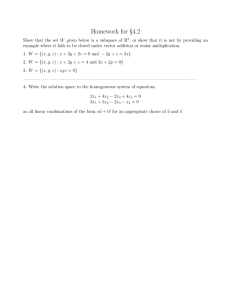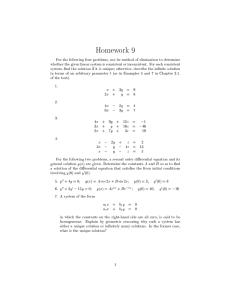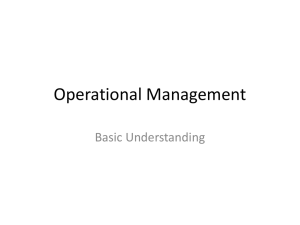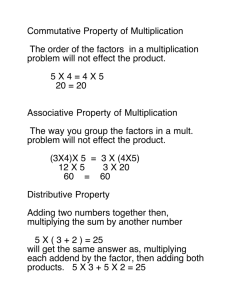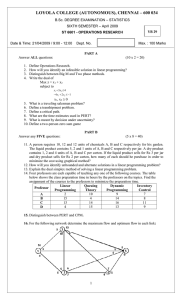p. 1 1) Which of the following is a correct statement about the three
advertisement
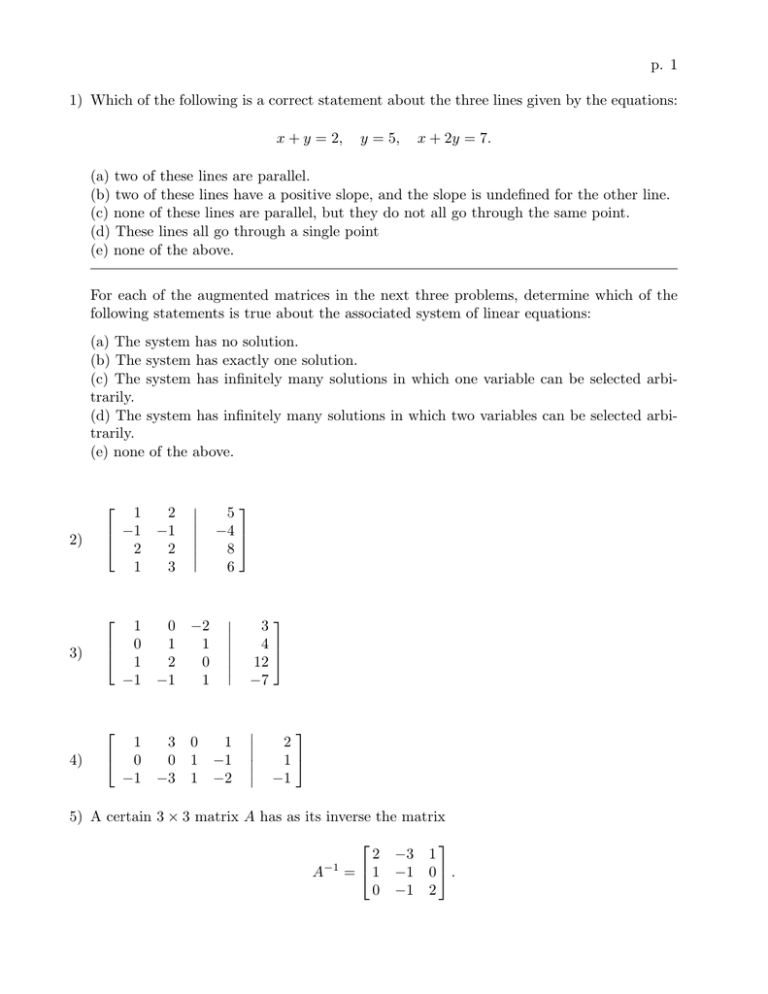
p. 1 1) Which of the following is a correct statement about the three lines given by the equations: x + y = 2, y = 5, x + 2y = 7. (a) two of these lines are parallel. (b) two of these lines have a positive slope, and the slope is undefined for the other line. (c) none of these lines are parallel, but they do not all go through the same point. (d) These lines all go through a single point (e) none of the above. For each of the augmented matrices in the next three problems, determine which of the following statements is true about the associated system of linear equations: (a) The system has no solution. (b) The system has exactly one solution. (c) The system has infinitely many solutions in which one variable can be selected arbitrarily. (d) The system has infinitely many solutions in which two variables can be selected arbitrarily. (e) none of the above. 2) 1 −1 2 1 3) 1 0 1 −1 4) 1 0 −1 2 −1 2 3 ¯ ¯ ¯ ¯ ¯ ¯ ¯ 0 1 2 −1 −2 1 0 1 5 −4 8 6 ¯ ¯ ¯ ¯ ¯ ¯ ¯ 3 0 1 0 1 −1 −3 1 −2 3 4 12 −7 ¯ ¯ ¯ ¯ ¯ ¯ 2 1 −1 5) A certain 3 × 3 matrix A has as its inverse the matrix A−1 2 = 1 0 −3 −1 −1 1 0. 2 p. 2 x 4 A y = −5 , z −3 If then what is the value of x? (a) 1 the above. (b) 15 (c) -1 (e) none of (d) 20 6) Find the maximum value of 2x + y on the feasible set given by the constraints: x + 10y ≤ 50, x + y ≤ 5, 10x + y ≤ 50, x ≥ 0, y ≥ 0. (a) 1 (b) 10 (c) 20 (d) 30 (e) none of the above. 7) Determine the matrix product [ −1 1 2 2] 0 1 3 0 3 (a) [ 3 0 ] (b) [ −3 0 ] (c) [ 0 3 ] (d) [ 1 4 ] (e) none of the above. 8) Which of the following is not a corner point of the feasible set given by x ≥ 0, y ≥ 0, 2x + y ≤ 4, x + 2y ≤ 4, 2x + 2y ≤ 5. (a) (2, 0) (b) (0, 2) (c) (1, 3/2) (d) (4/3, 4/3) (e) none of the above. 9) Given a system of 3 linear equations in 3 variables, which of the following can never occur? (a) There are infinitely many solutions. (b) There is exactly one solution. (c) There are exactly three solutions. (d) There are no solutions. (e) None of the above. p. 3 10) A cook in Chet’s Diner uses mixed vegetables to prepare stir fried vegetables as side dishes and to make vegetable soup. It takes 32 ounces of vegetables and 10 minutes of time to produce 10 servings of stir fried vegetables, and it takes 48 ounces of vegetables and 20 minutes of time to make a pot of soup which produces 8 bowls. The profit on one order of stir fried vegetables is $.30 and the profit on one bowl of soup is $.50. There are 160 ounces of vegetables and 60 minutes of time available. We wish to figure out how much of each food should be produced to yield maximum profit. Which of the following is the objective funtion when this situation is formulated as a linear programming problem: Let x be the number of orders of stir fried vegetables and y be the number of bowls of soup. (a) 10x + 20y (b) 32x + 48y (c) .30x + .50y (d) .50x + .30y (e) none of the above. 11) A feasible set for a linear programming problem is defined by x≥0 y≥0 2x + y ≤ 12 4x + 4y ≤ 44 Which of the following is not a corner point of the feasible set? (a) (1, 10) (b) (0, 12) (c) (0, 0) (d) (0, 11) (e) none of the above. 12) A Markov chain has the transition matrix 0 P = 1/5 2/5 2/5 4/5 1/5 3/5 0 2/5 and an initial state vector X0 = [1/6 1/3 1/2] . What is the probability that this chain will be in state 1 after two transitions? 13) A Markov chain has the transition matrix p. 4 1/2 P = 1/3 0 0 2/3 2/3 1/2 0 . 1/3 What is the first entry of the stable vector for this transition matrix? 14) A purchasing manager for a construction company purchases gravel from three companies Cox Gravel, Miller Rock, Smith Stone. In order to maintain competition between them and keep prices low, for each purchase she selects one of the suppliers at random according to the following rules: She never orders from the same supplier two times in succession. If one purchase is from Cox, then for the next purchase she is equally likely to select Miller or Smith. If one purchase is from Miller, then for the next purchase she is two times more likely to select Smith than to select Cox. If one purchase is from Smith, then for the next purchase she is three times more likely to select Miller than to select Cox. View this process as a Markov chain with state 1 being a purchase from Cox, state 2 being a purchase from Miller, and state 3 being a purchase from Smith. What is the transition matrix for this Markov chain? 15) A Markov chain has the transition matrix 0 P = 2/3 0 0 1 0 1/3 . 1 0 Is it regular? 16) The president of the bank must select one person to manage the East Gate branch, another person to manage the North Mall branch, and a third person to manage the West Shore branch. She will choose these managers from a group of 9 assistant managers. How many different outcomes axe possible? (A) 19,683 (F) 84 (B) 524 (G) 24 (C) 504 (H) 1 (D) 729 E) 27 (J) none of the others 17) An interior decorator must select a color of paint for each of apartments A, B, and C. If he chooses from 5 shades of off-white, 4 shades of yellow, and 3 shades of blue, how many different outcomes are possible? (A) 1,320 (B) 220 (F) 1,728 (G) 531,441 (L) none of the others (C) 60 (H) 12 (D) 33 (J) 36 (E) 3 (K) 216 18) When the 47 partners of the law firm met to determine whether to promote John or Susan (or both) from associate to partner, 34 favored promoting John, 31 favored promoting Susan, and 5 opposed both promotions. How many favored promoting both John and Susan? p. 5 (A) 11 (F) 28 (L) 16 (B) 18 (C) 13 (G) 5 (H) 33 (M) none of the others (D) 23 (i) 19 (E) 8 (K) 42 19) 70 % of the Chamber’s members favor mandatory health insurance and the rest oppose it. 80 % of those who favor mandatory health insurance favor welfare reform. 70 % of those who oppose mandatory health insurance favor welfare reform. If a member of the chamber is selected at random, what is the probability that this person does not favor welfare reform? (A) 0.75 (F) 0.16 (B) 0.35 (G) 0.35 (C) 0.77 (H) 0.23 (D) 0.65 (E) 0.25 (J) none of the others 20) A museum’s curator is to select 3 still lifes and 2 portraits by a certain artist for an anniversary show. The museum has 7 still lifes and 5 portraits by this artist. How many different outcomes are possible? (A) 95,040 (F) 31 (L) 210 (B) 5 (G) 350 (M) 792 (C) 1 (H) 45 (N) 60 (D) 8,575 (E) 4,200 (J) 230 (K) .368 (P) none of the others 21) 77% of a group of travelers have Visa cards, 66% have American Express cards, and 55% have both. If one of these travelers, selected at random, does not have a Visa card, what is the probability that this traveler also does not have an American Express card? 22) In a certain computer game, the player’s first opponent is either a dragon or a monster. Each time the game is played, the computer randomly and independently selects whether the first opponent is a dragon or a monster, and the probability that it selects a dragon is 4/7. If 4 people play this game, what is the probability that the first opponent is a dragon for three of them? 23) A bin contains 7 rolls of Kodak film and 5 rolls of Fuji film. If a customer selects 4 rolls simutaneously from this bin, how many different possible outcomes have at least one roll of Fuji film and at least one roll of Kodak film? (Each roll is a distinct object.) 24) How many distinct numbers ar there with digits 9,8,8,6,7,7,4,4 that are even (e.g. 98867744 is one, 79884746 is ¶another)? µ µ ¶ 3 1 −1 1 −1 25) a) Let A = . Then A = . Find a 2 × 2 matrix B such that 4 1 4 −3 −1 ABA µ = 0 1 1 0 ¶ . Notice that the matrix given on the right-hand side of the above equation is NOT the identity matrix. p. 6 b) Let A be the same matrix as in part a). Find a 2 × 2 matrix B such that µ (A + I)B − B = 1 0 0 1 ¶ . Notice that the matrix given on the right-hand side of the above equation IS the identity matrix. 26) On any given toss, an unfair coin has a probability of .7 of landing heads. The coin is tossed nine (9) times. What is the probability of getting 3 heads and 6 tails (in any order)? You may leave your answer as a product of numbers (e.g. 102(.7)8 (.4)3 is an answer in acceptable form). 27) On any given toss, an unfair coin that is VERY thick has a probability of .5 of landing heads, a probability of .3 of landing tails, and a probability of .2 of landing on its side. The coin is tossed nine (9) times. What is the probability of getting 6 heads and 2 tails and one “sider” (in any order)? The answer is (almost) given below P r[6H&2T &1S] = (.5)6 (.3)2 (.2)1 except that a number has to be placed in the blank. Fill in that blank (with a number). 28) Josie studies for 4/5 of her exams. If she studies, she has a 2/3 probability of passing. If she doesn’t study, she has a 1/2 probability of passing. a) (5 PTS.) You select, at random, one of the exams that she has taken. What is the probability that she studied for that exam and passed it? b) (10 PTS.) You select, at random, one of the exams that she has taken, and you see that she has passed it. What is the probability that she studied for the exam? 29) In the following, k is some number: 2x1 + 1x2 + 2x3 + 2x4 − 4x5 = k 2x1 + 2x2 + 2x3 + 3x4 − 4x5 = −3 2x1 + 1x2 + 2x3 + 3x4 − 4x5 = 0 . Solve this system for x2 . (A) k + 3 (B) −k − 3 (C) −k + 3 (D) −3 (F) none of the others 30) In the following, k is some number: 2x1 + 1x2 + 2x3 + 2x4 − 4x5 = k 2x1 + 2x2 + 2x3 + 3x4 − 4x5 = −3 (E) 0 p. 7 2x1 + 1x2 + 2x3 + 3x4 − 4x5 = 0 . Solve this system for x1 in terms of the free variables. 31) Let a and b be numbers and let µ A= a 20 10 b ¶ 1 B= 1 0 0 0 2 Find the (3,2) entry of BA - B. (A) a (B) a − 1 (C) 40 (D) 2b (E) 2b − 2 (F) none of the others 32) Find the entry in row 1 and column three of the matrix A−1 , where 1 A= 0 0 (A) 3a (B) −3a a 0 1 −3 0 1 (C) 3 + a (D) 3 (E) −3 (F) none of the others 33) If the following augmented matrix 0 0 2 4 1 2 0 6 3 0 10 5 a b 4a 4b a b 10 40 . 10 is row reduced, and if a 6= 0 the (1,5) entry will be: (A) 4a (B) 1 (F) none of the others (C) 0 (D) 3a (E) −3a
